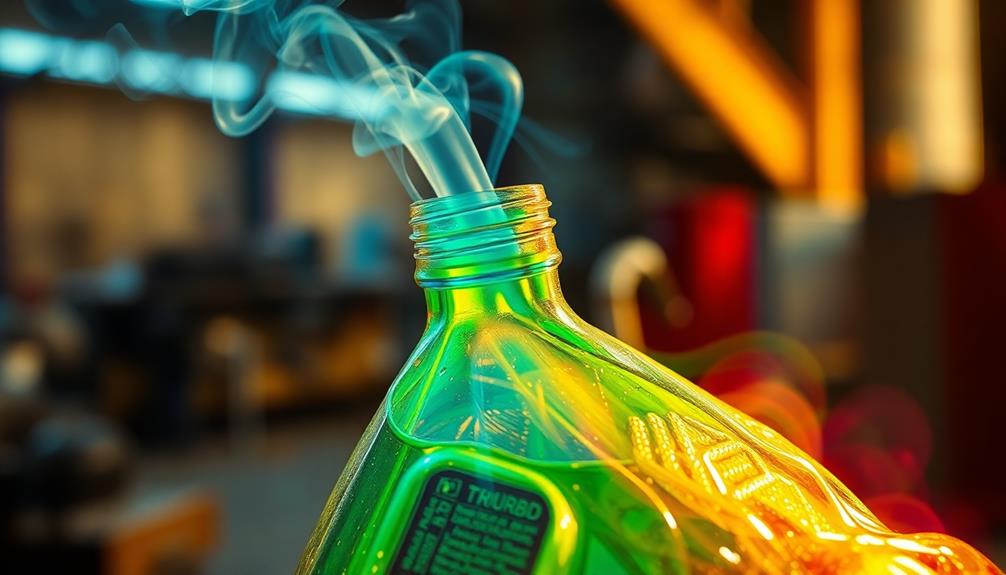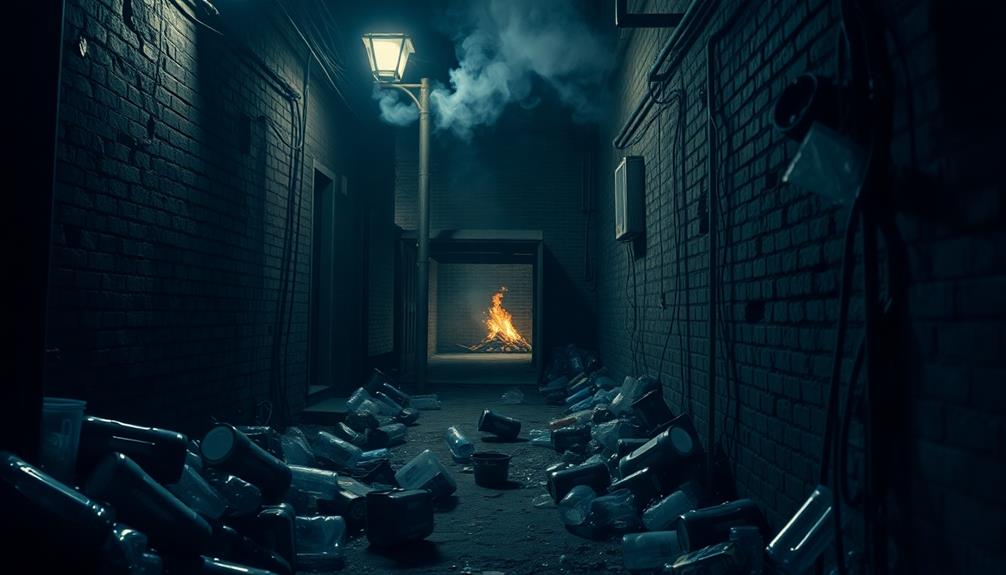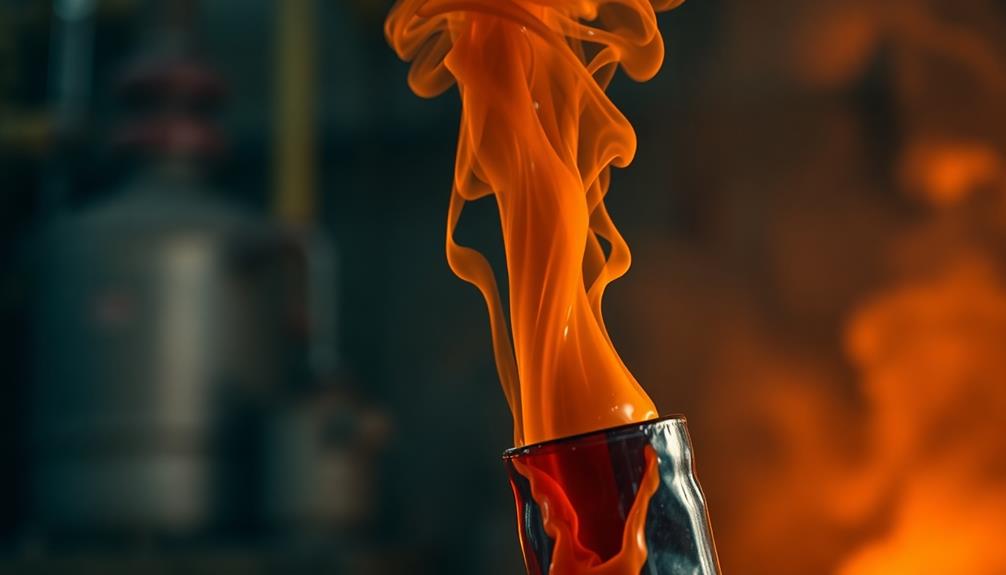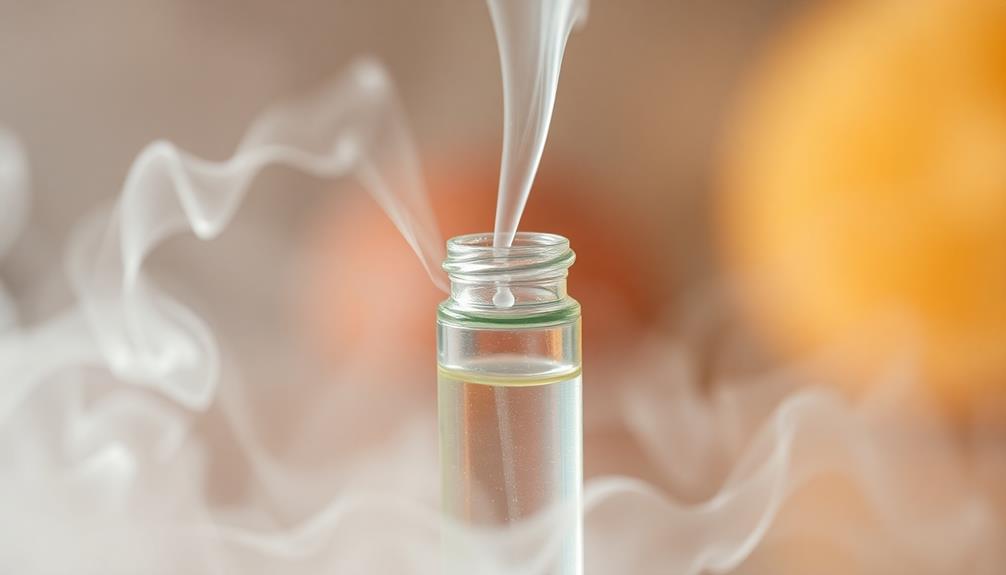When you smell burning plastic, it's sharp and acrid, almost like a harsh chemical scent. This odor usually means there's an issue, often from overheating appliances or electrical problems. You might notice it near microwaves, toasters, or older heating systems. It's essential to act quickly! Open windows for ventilation and turn off any affected appliances to stay safe. Remember, inhaling those toxic fumes can be harmful to your health. So, if you catch this smell, don't ignore it. There's more to explore about the risks and preventive measures you can take to keep your space safe.
Key Takeaways
- Burning plastic emits a sharp, acrid, and chemical-like odor, distinct from burnt food or musty smells.
- The smell often indicates overheating appliances or potential electrical fires, requiring immediate investigation.
- Different types of plastics can produce unique odors; for instance, PVC has a particularly harsh scent when burned.
- Inhalation of toxic fumes from burning plastic can cause respiratory issues and other health risks.
- Prompt action, such as ventilating the area and turning off power to affected appliances, is essential for safety.
Introduction

When you catch a whiff of burning plastic, it's more than just an unpleasant scent—it's a warning sign. The smell of burning can mean serious problems, like electrical issues or overheated electrical wiring.
You might notice this sharp, chemical-like odor coming from malfunctioning appliances or even burning debris stuck in air ducts. These burning plastic smells signal that you need to act fast. Ignoring these warning signs could lead to potentially hazardous situations, such as electrical fires or toxic fumes. In addition to these smells, homeowners should also stay vigilant about identifying mildew odors in your home, as they can indicate moisture issues or mold growth. Such problems not only affect air quality but can also pose serious health risks if left untreated.
If you detect this odor, look for signs of melting or smoke. Don't ignore it! This could mean potential electrical fires are lurking nearby.
It's crucial to take urgent action by ventilating the area and, if necessary, evacuating your home. Burning plastic can release toxic fumes that aren't safe to breathe.
Description of the Smell

The smell of burning plastic is unmistakable and often overwhelming, characterized by a sharp, acrid scent that can linger in the air. This sharp odor isn't just unpleasant; it's a chemical-like odor that signals serious issues. When you catch a whiff of this burning plastic smell, it might mean there are overheating appliances or even electrical fires nearby. You shouldn't ignore it!
Burning plastic emits toxic fumes that can pose health risks, making it important to act quickly. Unlike the smell of burnt food or musty air, this odor stands out as a unique warning sign. It's vital to identify the source of the burning plastic smell, as it may indicate malfunctioning electrical systems or overheated devices.
If you notice this smell, take a moment to check around your home. Look for any appliances that might be acting up or any signs of smoke.
Source and Composition

Burning plastic odors often stem from a range of sources, primarily involving overheated electrical components and malfunctioning appliances.
You might notice this sharp, chemical-like smell when wiring gets too hot or when an appliance is acting up. For instance, if you have a toaster or microwave that's been overused, it can start to emit that unmistakable burning plastic odor.
The composition of burning plastic can release toxic fumes, including dioxins and furans, which pose serious health risks if inhaled.
Different types of plastics give off distinct smells when they burn. For example, burning polyvinyl chloride, or PVC, can create a particularly harsh and acrid odor.
If you catch a whiff of a strong burning smell, it's essential to take it seriously. A more intense odor usually means there's a more severe overheating or electrical problem happening.
Always remember, safety comes first. If you smell burning plastic, turn off any nearby appliances, unplug them, and ventilate the area. It's better to be safe and avoid any potential health risks from those harmful fumes!
Typical Scenarios or Environments

Experiencing a burning plastic smell can happen in various everyday environments, often tied to malfunctioning electrical appliances. You might notice this smell in your home when kitchen appliances, like toasters or microwaves, overheat, especially if food is left unattended. This sharp, chemical-like odor often signals trouble, so it's important to pay attention.
Additionally, if you have an older heat pump, it may also contribute to the smell if it's experiencing mechanical failures or electrical issues, which can be exacerbated by inadequate maintenance and poor installation practices top-rated heat pumps.
Another common cause can be your HVAC system. If you detect the burning plastic smell, it may indicate clogged air filters or components overheating. Ignoring this could lead to more severe issues, so consider checking your system regularly.
Sometimes, the smell arises during the initial heating of your heating system, where dust on components burns off. This can be mistaken for burning plastic. Additionally, faulty wiring or overloaded circuit breakers can create an electrical fire smell that you should never overlook.
If you encounter this smell, act fast! Open windows for ventilation and turn off the affected appliances. Knowing these typical scenarios will help you recognize and respond to the burning plastic smell before it leads to hazardous situations. Stay safe and alert in your home!
Emotional or Cultural Associations

Notably, the smell of burning plastic stirs a sense of anxiety and urgency in many people. When you catch a whiff of that chemical-like scent, it can trigger negative memories or feelings of fear. Perhaps you've experienced an electrical fire or overheated appliance before, and now, that smell feels alarmingly familiar. It's hard not to feel warm inside with worry, thinking about the potential dangers lurking around you.
In different cultures, the scent can symbolize modernity and industrialization. Plastic is everywhere, but it also brings up thoughts about environmental issues and pollution. This adds another layer to your emotional response, making you more aware of your surroundings. You might find yourself taking immediate action, checking appliances or cleaning up areas that feel unsafe.
The smell of burning plastic serves as a reminder of the fragility of safety in our lives. It emphasizes the need for home maintenance and safety practices.
Health or Safety Considerations

Detecting the smell of burning plastic can trigger immediate concern for your health and safety. This sharp, chemical-like odor often signals overheating appliances or even electrical fires, which pose serious health risks. Inhaling toxic fumes from burning plastic can lead to respiratory issues, nausea, and irritation of your eyes, skin, and throat.
If you notice this smell, act fast! First, ventilate the area by opening windows and doors to help clear out harmful air. If the smell is strong or you see smoke, it's crucial to evacuate the space immediately. Don't take chances with your safety.
Next, turn off the power to the affected area to reduce the risk of fire hazards. After you've ensured your safety, seek professional assistance to investigate the source of the burning plastic smell.
Final Thoughts

Addressing the smell of burning plastic promptly is vital for your safety and well-being. If you notice this sharp, chemical-like odor, it's essential to find out where the smell is coming from. Common sources include electrical issues, overheated appliances, or melting plastic items near heat sources.
Never ignore this smell, as it can signal serious issues, like potential fires.
First, ventilate the area to reduce exposure to toxic fumes. Open windows and doors to let fresh air in. If the smell persists and you can't identify the source, it's best to call a professional. They can help you find and fix any problems, preventing further damage.
Regular maintenance and inspections of your electrical systems and appliances are crucial too. This can help you catch issues before they turn into serious problems.
Frequently Asked Questions
What Is the Burning Plastic Smell?
When you notice a sharp, chemical-like odor, it often signals potential danger. This smell could indicate overheating appliances or electrical issues. You should act quickly to ensure your safety and investigate the source immediately.
Does Burning Plastic Smell Fishy?
No, burning plastic doesn't smell fishy. It usually has a sharp, acrid scent. If you detect a fishy odor alongside it, you should check for other potential hazards, as they might indicate different burning materials.
Is Plastic Smell Toxic to Humans?
Yes, plastic smell can be toxic to you. Burning plastic releases harmful chemicals that may cause headaches, respiratory issues, and long-term health risks. If you detect this smell, ensure proper ventilation and seek medical advice if needed.
What Does an Electrical Burning Smell Smell Like?
When you smell an electrical burning odor, it's sharp and chemical-like. It often means something's overheating or malfunctioning. Don't ignore it; turn off the power and call a professional to avoid potential hazards.









